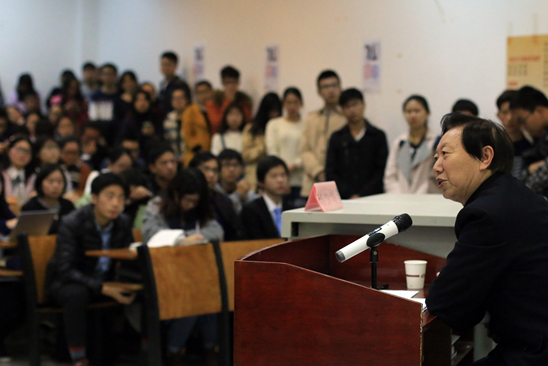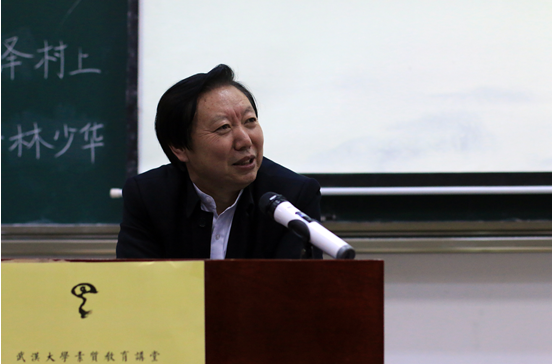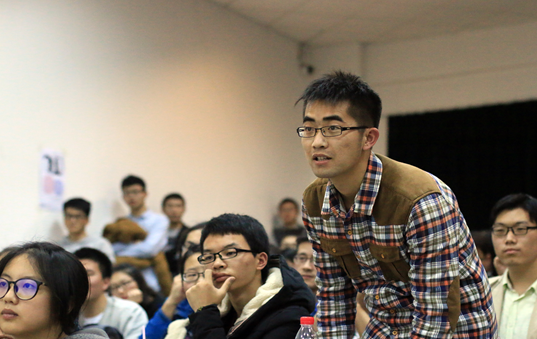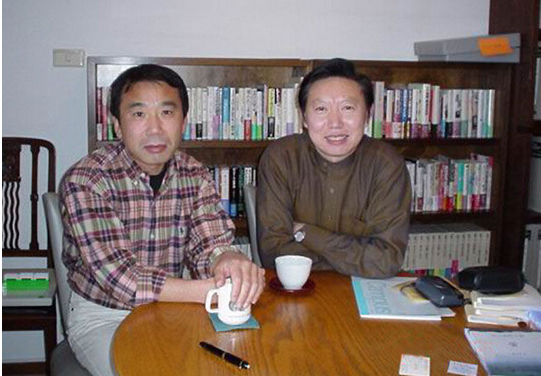In mid-November, Prof. Lin Shaohua from the College of Foreign Languages in the Ocean University of China, who is also known as the translator of Haruki Murakami’s works, was invited by Lecture of Liberal Education in WHU to deliver a speech on his experience in translating Haruki Murakami’s works.

Mr. Lin delivering his speech
Haruki Murakami through Lin’s eyes
As the most popular Chinese translator of a popular Japanese writer, Mr. Lin began his speech by explaining why Haruki Murakami’s works are so popular in the market of Chinese readers.
The core reason lies in the direction of Haruki Murakami’s works. Mr. Lin sees Haruki Murakami’s works as interesting stories that speaks of dignity and freedom, concerns the softest part of human’s inner feelings and touches the souls.
Referring to his own works, Haruki Murakami said, “I want to be free. I am constrained by many worldly distractions in daily lives. I need to make myself free in my work.”
However, to touch one’s soul is not an easy thing for anyone, even for a writer. You need to find the most common part of all human beings. You should present a universal atmosphere in your work. You must speak to your readers directly, soul to soul beyond the lines. But Haruki Murakami has succeeded without doubt and for a very long time.
Student Liu from Hubei University of Education claimed perhaps it’s because Haruki Murakami’s works can reach the deepest part of our heart. In Mr. Lin’s opinion, he owed this success to the real connection between Haruki Murakami and his readers -- the loneliness.
In terms of seeking connection, Mr. Lin divided Haruki Murakami’s works into two stages. In the first stage, it has taken Haruki Murakami 15 years to Dig a Hole, and he spent another 20 years Knocking into the Wall in the second stage.
In Haruki Murakami’s eyes, life itself is lonely inborn. But instead of isolating oneself from others, one needs to consistently ‘dig a hole’ and finally he will reach that common part shared with all others. Thus, connection is formed. “In simple words,” Mr. Lin explained, “the common loneliness in people is the connection of communication.”
To dig a hole is the first stage and it is to let one’s soul become more free. Norwegian Wood, Dance Dance Dance and South of the Border West of the Sun are all works in this period. In translating this period’s works, Mr. Lin confessed that he has been obsessed by the precise, fresh, and elegant expressions of Haruki Murakami. The way of his thinking and expression miraculously coincided with Mr. Lin’s. And that is why Mr. Lin has translated so many of his works, “you will be unwilling to translate a writer’s work unless you liked him/her.”

“I like Murakami’s way of expression”
To handle loneliness by digging a hole is not enough. To Knock the Wall became the task of Haruki Murakami’s secondary writing period.
Works in this period paid attention to the systematic, political, even social roots on the hindrance to freedom rather than focusing on individuals’ feelings. In these works, the harsh, forcible social reality of pre-war Japan was exposed to the readers completely. The Wind-Up Bird Chronicle disclosed and criticized the source and manifestation patterns of Japanese national violence before the Second World War. Kafka on the Shore pointing directly to the most vicious part of Japanese history-the heresy. Clearly, Murakami realized that digging a hole couldn’t provide a resolution to real freedom. So he sought answers in historical and political contexts in a more penetrating and embedded way to -- to Knock into the Wall between different culture.
As Haruki Murakami put forward the notion of Walls and Eggs (“Between a high, solid wall and an egg that breaks against it, I will always stand on the side of the egg.”) in 2009, he has always voiced for the weak mass and the thousands of lonely souls, who yearn for freedom and dignity.
Everyone is somewhat of an egg; we are threatened by the wall, which is the system outside ourselves. This is Mr. Lin’s understanding towards the notion of Walls and Eggs. Yet there was much concern among the audience such as the collapse of the wall, the security of the newly-built wall, the legal and moral standard of the eggs.

A student asking a question
To respond to the concern, Mr. Lin encouraged students to understand Murakami’s works more rationally. But Mr. Lin further illustrated there is no denying that Murakami has taught us how to build a small but solid tent under this commercial, modern and complicated world. In reading his work, you feel all your inner passion and feelings calmed by his peaceful lines.
Haruki Murakami through Lin’s translation
The wide-spread of Murakami’s works in China can’t be separated from Mr. Lin’s translation.
According to Mr. Lin, the original work is just like a stranger, the task of a translator is to accommodate the stranger in the domestic culture. No matter what effort the translator has put forth, the stranger is always the stranger, and they will never become a native. This heterogeneity is also the charm of translation. All the translators are dedicated to manipulate this heterogeneity as best as they can. It is also the manipulation of heterogeneity that distinguishes the quality of the translated text.
Along with this, one can never seek perfection in translation. Mr. Lin said there is no such thing as “100% Haruki Murakami” in the translated version of his work although he had believed that he could do it before. While now he admitted that translation, especially literary translation, certainly would lose something during the language transformation. The translated text is always on the way to being close to the original work.
But taking another perspective to admire the translated work, what matters is not the form, but the poetic theme and soul of the work.
That’s why we prefer Lin’s translated version of Murakami’s work. Like Walter Benjamin celebrating the translation as the “after-life” of the source text, its mean of survival, its reincarnation, Mr. Lin also sees his translation as a development of Murakami’s work, which displays a beauty of heterogeneity and strangeness. Art needs difference and that’s also the life of art.
Translation, as an art form and a discipline, is very young compared with other traditions of art and other long-established disciplines. It’s difficult to place translators in the history of translation and grand social context. Mr. Lin pioneered in literary translation to show that literary translators will only win a position in domestic translated literature instead of attaining a reputation in foreign literature. This is the modesty of a professional translator and also a clear perception toward translators’ position in history.
When it came time to how to do well in literary translation, Mr. Lin spoke pleasantly but sternly:
“First, you need to read large sums of Chinese works. Our Chinese literature provides precious deposits for us to explore. One can never label himself a literati if he hasn’t read the Song Poems, which reveals the magnificent manipulation of Chinese words.
Second, a lot of writing practice is necessary. I’ve asked a student who wanted to learn translation whether he kept a diary. I received the answer no. To keep a diary is the simplest writing practice in ordinary life and it always slip off our students’ mind.
Third, you must remember that not everyone can be a translator. You must be somewhat of a genius in the power of understanding in terms of language or we can say you must have “Wu Xing” in Chinese. Only by this power of understanding can you possibly translate the soul of a work.”
Having risen to fame for many years, Mr. Lin still keeps himself a low profile in the literary circle. In the flood of online media, Lin never uses the computer to do translation. A pen is enough and suitable for him and it never influences his flow of thinking, but a computer can do so by automatically choosing words for him. The almost pathological “mysophobia” for language makes Mr. Lin censorious all the time. Redundancy, violation, inaccuracy, vulgarity offers no viable options for him.

Haruki Murakami and Lin Shaohua (from the internet)
Haruki Murakami is a great Japanese writer and Lin Shaohua is an excellent Chinese translator. Because of Haruki Murakami, Lin has the stage to perform his translation talent and became known to the Chinese audiences. Thanks to Mr. Lin’s translation, Murakami’s works could be understood by a large number of Chinese readers and became so loved and popular in China. It’s hard to say which one has influence over the other one. Most people will think they pose impact upon each other.
Hawking has said that the most beautiful beauty in the universe is the similarity in different space-time. Lin and Murakami, counterparts in the same time period but in different national space, displaying fantastic literary similarity on the world literature stage. This is a great blessing for the literary arena but also for us readers across the world.
(Photo by Wu Jiamin, Edited by Liu Jiachen, Edmund & Hu Sijia)